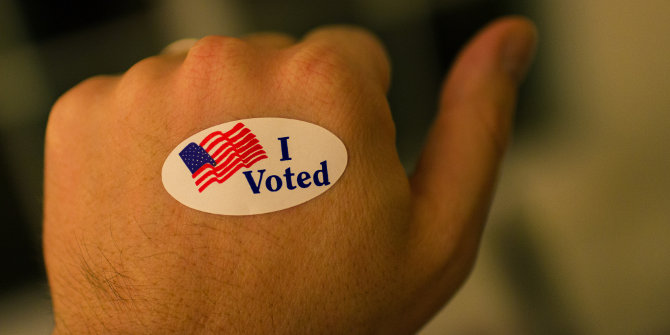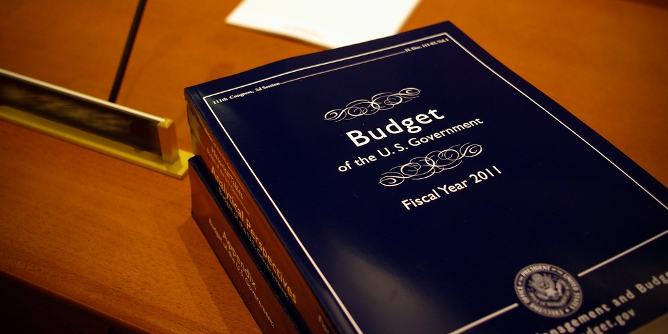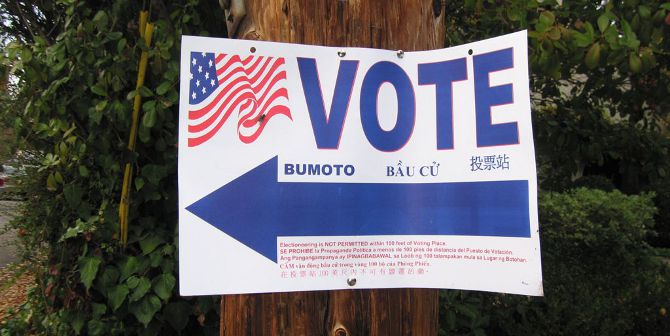
 In 2010, the Supreme Court ruled that outside groups could spend money without limits on US political campaigns, opening the door to massive increases in independent campaign expenditures in the years that have followed. In new research Wendy Hansen and Michael Rocca find that despite concerns over the rise of corporate influence on politics, much of this increase in campaign expenditures has not come from the largest companies or those who are in charge of them, but from high net-worth individuals.
In 2010, the Supreme Court ruled that outside groups could spend money without limits on US political campaigns, opening the door to massive increases in independent campaign expenditures in the years that have followed. In new research Wendy Hansen and Michael Rocca find that despite concerns over the rise of corporate influence on politics, much of this increase in campaign expenditures has not come from the largest companies or those who are in charge of them, but from high net-worth individuals.
It has been almost ten years since the Supreme Court’s landmark Citizens United v. Federal Elections Commission decision. Of the key consequences of the Citizens United decision, two stand out. First, it allowed outside groups, most notably corporations and labor unions, to spend money out of their general treasuries on “express advocacy” and “electioneering communications” without limits. Prior to the ruling, corporations and unions were restricted under the Taft-Hartley Act of 1947 from making independent expenditures (IEs) in support of or opposition to federal candidates. Second, it opened the door for the creation of “Super PACs,” political committees registered with the Federal Elections Commission (FEC) that make independent expenditures (IEs) to expressly support or oppose candidates to federal office but cannot contribute directly to federal candidates. Since they only make IEs, Super PACs can accept unlimited amounts of contributions from individuals, corporations, and unions.
In his 2010 State of the Union Address, President Barack Obama criticized the Supreme Court’s Citizens United ruling for reversing “a century of law to open the floodgates for special interests… to spend without limit in our elections.” Adding to the drama of the moment was Justice Samuel Alito’s response; he appeared to respond to the President’s criticism by mouthing “not true.” Did the floodgates open? Figure 1 below suggests that they may have.
Figure 1- Spending in US Federal Elections, 2000-2018
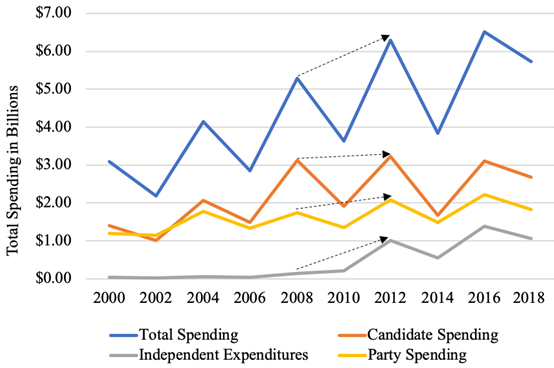
NOTE: Independent expenditure totals exclude party spending. Total, party and candidate spending, as well as independent expenditure data, available through the Center for Responsive Politics.
Figure 1 shows total spending in United States midterm and presidential elections from 2000 to 2018. Note the jump in total spending between the 2008 and 2012 presidential elections. While the 19 percent increase between elections is not the largest increase during this time period (the 2000 to 2004 saw a 35 percent increase), the jump can almost entirely be attributed to the increase in independent expenditures (IEs). In fact, the 2012 presidential election saw a 594 percent increase in IEs from the 2008 election ($144 million in 2008 to $1 billion in 2012). It appears the Court’s 2010 Citizens United decision did indeed open the floodgates.
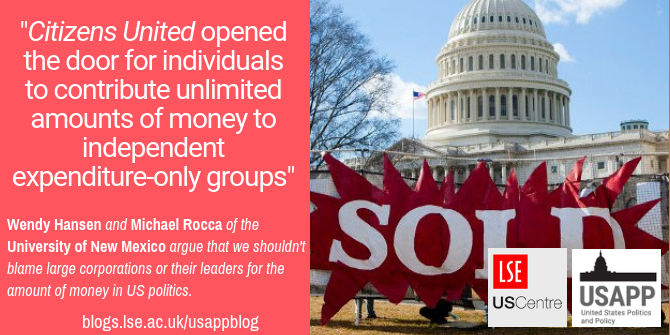
“Photo by Brendan Hoffman” by Public Citizen is licensed under CC BY NC SA 2.0
But to what extent are corporations – the main subject of the Citizens ruling – to blame for this increase? And how has the post-Citizens environment been exploited by large corporations and their employees? Our research (here and here) suggests two conclusions:
- Corporations are not to blame for the increase in independent expenditures. In a 2015 study, we examined the spending patterns of the US’s largest companies using Fortune magazine’s well-known Fortune 500 Our goal was to determine the effect of the Supreme Court’s 2010 Citizens United ruling on corporate spending in federal elections. We were particularly interested if it altered corporate spending through corporate affiliated political action committees (PACs), IEs by the corporation for express advocacy and electioneering or IEs through corporate contributions to Super PACs. We found that the ruling did little to alter the electoral spending strategy of the world’s leading corporations. Specifically, corporations used their PACs in 2012 as they did in 2008, they did not spend on electioneering from their general treasury, and only 10 of the Fortune 500 firms gave to Super PACs. Simply stated, Citizens United did not open the floodgates to corporate spending in federal elections.
- Employees of large corporations did not alter their behavior after Citizens United. In a 2019 publication in Political Research Quarterly, we examine the contribution patterns of employees of Fortune 500 We examined employee contributions to: (1) corporate affiliated PACs, (2) industry PACs, (3) Super PACs, and (4) traditional political committees including party committees, individual candidate campaign committees, and political action committees unaffiliated with the corporation. We found that Citizens United did not alter Fortune 500 employees’ contribution patterns to traditional political committees. In fact, Fortune 500 employee contributions to traditional political committees still outweigh Super PAC contributions in both numbers and amount. Both trends can be seen in Figure 2 below. Total dollar contributions to corporate and industry PACs, respectively, were almost identical in 2008 and 2012, and only about $5 million separated the total contributions to other traditional committees (e.g. PAC, party and candidate campaign committees) across the electoral cycles.
Figure 2 – Total contributions by Fortune 500 employees across committee type and presidential election year
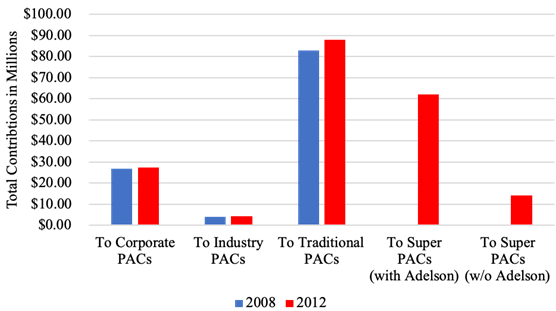
NOTE: Figure 2 depicts total contributions to Super PACs both including and excluding Sheldon Adelson of Las Vegas Sands, who alone contributed $48,346,625 to Super PACs in 2012.
That is not to say, of course, that Citizens United did not have a dramatic effect on other types of electoral spending. It most certainly did. What was the source of the increase, if not corporate spending? It was, in short, individuals. Indeed, Citizens United (and the rulings that followed) opened the door for individuals to contribute unlimited amounts of money to independent expenditure-only groups (Super PACs). In all, according to the Center for Responsive Politics, over 60 percent of all Super PAC donations came from individuals. But few were leaders of Fortune 500 companies. Indeed, of the top one hundred individual contributors to outside groups in 2016 (including Super PACs), only six were affiliated with a Fortune 500 company:
- Sheldon Adelson of Las Vegas Sands (ranked 2nd at $77.9 million)
- Larry Ellison of Oracle (ranked 30th at $5.3 million)
- Mark Epstein of Qualcomm (ranked 45th at $3.8 million)
- Charles Johnson of Franklin Resources (ranked 70th at $2.2 million)
- Charles Schwab of Charles Schwab and Company (ranked 95th at $1.6 million)
- Kelcy Warren of Energy Transfer Partners (ranked 96th at $1.5 million)
What does this mean for representation? In The Semisovereign People, E.E. Schattschneider argued that pressure politics is selective, involving only a small minority. The system is “skewed, loaded and unbalanced” representing only the upper economic class. Our findings suggest that the US has moved to an even further extreme where representation is no longer dominated by a small number of select groups, but a small number of individuals who are able to dominate the system.
- This article is based on the paper, ‘The Impact of Citizens United on Large Corporations and Their Employees’, in Political Research Quarterly.
Please read our comments policy before commenting.
Note: This article gives the views of the author, and not the position of USAPP – American Politics and Policy, nor the London School of Economics.
Shortened URL for this post: http://bit.ly/2XgLp5F
About the authors
 Wendy L. Hansen – University of New Mexico
Wendy L. Hansen – University of New Mexico
Wendy L. Hansen is a Professor of Political Science at the University of New Mexico. She has broad research interests in political science and economics, with emphasis on the role that individuals, corporations and government institutions play in decision-making over a wide range of public policy issues, including money in politics, campaign finance reform, international trade, human rights and refugees.
 Michael S. Rocca – University of New Mexico
Michael S. Rocca – University of New Mexico
Michael S. Rocca is an Associate Professor of Political Science at the University of New Mexico. Professor Rocca’s subfield is American politics and his primary research and teaching interests relate to American national institutions, particularly the US Congress, as well as campaign spending US elections.



